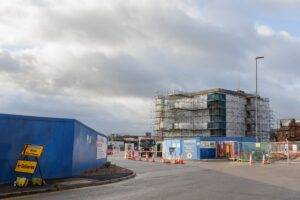
Mayors Burnham and Street Unite on Cost-Effective Alternatives to Scrapped HS2 Northern Section

In a notable collaboration, Andy Burnham, the Labour mayor of Greater Manchester, and Andy Street, the Tory mayor of the West Midlands, have come together to present alternative plans for the abandoned section of HS2, emphasising that inaction is not viable.
Taking the stage together, Burnham and Street outlined three potential options following the government’s decision to halt the long-awaited northern segment of the high-speed rail project. They asserted that their proposed alternatives, largely backed by private funding, would incur significantly lower costs compared to HS2, albeit without precise figures available at this initial stage.
To spearhead their initiative, the mayors established a consortium chaired by Sir David Higgins, a former HS2 chair, involving private engineering and finance firms such as Arup, EY, Skanska, and Mace.
The move comes in response to the cancellation of the northern leg of HS2 announced in October, with Rishi Sunak pledging £36 billion towards alternative transport initiatives under the banner of Network North.
Street lamented the cancellation of the northern HS2 line as a setback, highlighting the congestion on the west coast mainline and M6 motorway, underscoring the imperative to explore alternative solutions.
Burnham echoed this sentiment, stressing the necessity of addressing rail capacity between the West Midlands and Greater Manchester to sustain economic growth. He warned that neglecting this issue would result in significant transport challenges for generations to come.
One of the proposed options unveiled involves constructing a segregated line akin to the original HS2 plan but with reduced maximum speeds, thereby cutting costs. Street clarified that this alternative route would closely resemble the scrapped HS2 section, albeit with slower trains, as the high costs of HS2 were partly attributed to its uncompromising speed requirements, with trains set to operate at up to 225mph.
Burnham noted that the northern leg of HS2 was comparatively straightforward in terms of infrastructure requirements, as no extensive tunneling was necessary. The envisaged new line would primarily cater to passenger services, allowing existing freight traffic to utilize the west coast mainline.
Regarding potential stops along the route, Street indicated a willingness to consider intermediate stations between Crewe and Manchester, albeit in limited numbers.
Aside from the new line proposal, the mayors presented two additional options: enhancing segments of the existing west coast mainline or implementing bypasses on its busiest sections. However, Street suggested these alternatives would offer marginal benefits with minimal capital investment.
Emphasizing that their proposals were not an attempt to revive HS2, Burnham clarified that they had accepted the government’s decision. However, they expressed optimism following constructive discussions with Transport Secretary Mark Harper, who demonstrated receptiveness to their proposals. Notably, ministers have granted approval for involvement from HS2 and Network Rail in further exploring these alternatives.
Read more:
Mayors Burnham and Street Unite on Cost-Effective Alternatives to Scrapped HS2 Northern Section
